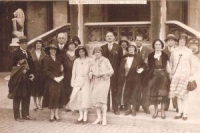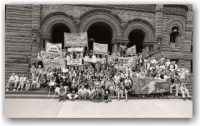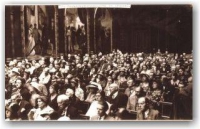The IPB was founded in 1891-92, as a result of consultations at the Universal Peace Congresses, large gatherings held annually to bring together the national peace societies that had gradually developed, mainly in Europe and North America, from the end of the Napoleonic Wars onwards.
IPB has a long and fascinating history that falls into three main phases, each reflecting stages in the development of the 20th century peace movement :
- – Dynamic early years
- – Decline and rebirth
- – Modern era
The dynamic early years
The IPB was founded in 1891-92, as a result of consultations at the Universal Peace Congresses, large gatherings held annually to bring together the national peace societies that had gradually developed, mainly in Europe and North America, from the end of the Napoleonic Wars onwards. The representatives of the Peace Societies felt that the movement needed a permanent office to coordinate the activities of the national associations and to organise the Universal Peace Congresses. Thus was born the ‘Permanent International Peace Bureau’, as it was known (‘Permanent’ was later dropped from the title).
The seat of the new organisation was Berne, the capital of neutral Switzerland. The first President of the IPB was the Dane Fredrik Bajer and its first Secretary-General the Swiss Elie Ducommun. Ducommun was later succeeded by another Swiss, Albert Gobat. Both of them, and Fredrik Bajer, won the Nobel Peace Prize.
Another Nobel laureate was the colourful Austrian countess Bertha von Suttner, who was a friend of Alfred Nobel and encouraged him to establish the Peace Prize. She was the author of the celebrated book (and film) Lay Down your Arms! It should be noted that between 1901 and 1982 thirteen of IPB’s officers individually received the Nobel Peace Prize, as well as the Bureau itself in 1910.
During these early years the IPB was more or less the only international peace organization. It took positions, not only in favour of disarmament, but also on the various international conflicts of the day. Its basic ideological approach has been described as bourgeois pacifism, i.e. a heavy emphasis on the development of international law, disarmament and the peaceful settlement of conflicts. Von Suttner and others entered into dialogue with Tsar Nicholas II, urging him to establish an International Peace Conference, an idea that eventually came to fruition at the Hague in 1899 and 1907. IPB was active in promoting the idea of the establishment of a League of Nations and an International Court, although some individuals had doubts about the kind of peace that would result from what were basically inter-state institutions.
The period of decline and rebirth
 The IPB was of course unable to prevent the outbreak of World War 1, and in due course, World War 2. During both of these conflicts the peace movement was largely inactive (with certain notable exceptions such as the women’s gathering in 1915 that led to the creation of the Women’s International League for Peace and Freedom). Many peace activists were either swept up in the war fever, joined the armed forces, or were limited to providing aid to refugees and wounded combatants. Many IPB members shared the enthusiasm surrounding the birth of the League of Nations, and it was logical that the Bureau should move its office to Geneva in 1924 to be close to the international institutions there.
The IPB was of course unable to prevent the outbreak of World War 1, and in due course, World War 2. During both of these conflicts the peace movement was largely inactive (with certain notable exceptions such as the women’s gathering in 1915 that led to the creation of the Women’s International League for Peace and Freedom). Many peace activists were either swept up in the war fever, joined the armed forces, or were limited to providing aid to refugees and wounded combatants. Many IPB members shared the enthusiasm surrounding the birth of the League of Nations, and it was logical that the Bureau should move its office to Geneva in 1924 to be close to the international institutions there.
In the inter-war period IPB struggled to get its voice heard but was gradually drowned out in the rising tide of nationalism. Secretary-General since 1911, Henri Golay was able to keep the Bureau functioning until the outbreak of war in 1939. His death in 1950 marked the end of the old IPB, but a new one was in the process of being born. After many organisational complications the International Liaison Committee of Organisations for Peace (ILCOP), which had inherited the assets of the old IPB, was renamed IPB in 1964 and ILCOP became a small private foundation. IPB opened a new office at the current address, and began to rebuild a new membership.
Growth and change: the modern era
 Since the 1960s the IPB’s primary concerns have largely reflected those of the movement as a whole in Western countries. These include the struggle against the Vietnam war, the right to conscientious objection, the UN Special Sessions on Disarmament, the Freeze and Euromissile campaigns and the European Nuclear Disarmament movement, foreign military bases, the illegality (and abolition) of nuclear weapons (World Court Project, Abolition 2000 etc), the Gulf War, the arms trade, militarism and the environment, the Non-Proliferation Treaty, women and peace, and the prevention and resolution of conflicts.
Since the 1960s the IPB’s primary concerns have largely reflected those of the movement as a whole in Western countries. These include the struggle against the Vietnam war, the right to conscientious objection, the UN Special Sessions on Disarmament, the Freeze and Euromissile campaigns and the European Nuclear Disarmament movement, foreign military bases, the illegality (and abolition) of nuclear weapons (World Court Project, Abolition 2000 etc), the Gulf War, the arms trade, militarism and the environment, the Non-Proliferation Treaty, women and peace, and the prevention and resolution of conflicts.
IPB’s membership remained low in the 60s and 70s, but rose sharply after the merger with the International Confederation for Disarmament and Peace in 1984. In 1963 there were 17 member organisations. There are now 186.
The first President of the new IPB was Ernst Wolf (1963-1974) who was the mastermind behind the merger and the establishment of the ILCOP foundation. He was succeeded in 1974 by Sean MacBride, who continued until 1985, giving way to Bruce Kent of British CND.
Currently, the IPB has two co-presidents: Ingeborg Breines and Reiner Braun.
Various individuals have held the post of Secretary-General, among them Ulrich Herz (1967-71) and Rainer Santi (1986-1990) both of Sweden, and the current postholder Colin Archer (1990-) from the UK. Others who have devoted many years of work to the Secretariat include the late Arthur Booth (chairman 1968-80), and a long list of volunteers.
In 1991-92, various commemorative events were held for the centenary of IPB, including a reception and evening of speeches in Berne, an exhibition organised at the Palais des Nations by the League of Nations Archives Service, the presentation to the UN of the Lawyers’ Appeal against Nuclear Weapons published in 1987 by Sean MacBride, the international launch in Geneva of the World Court Project, and a multi-site centenary conference held in Helsinki, Stockholm and Tallinn.
In 2005, IPB launched its main programme Disarmament for Development designed to reflect widespread public concern at the rapid rise in global military spending and the evidence that weapons seriously impede sustainable development.
The full text of IPB’s history, written by its former Secretary General, Rainer Santi, is available here.
Texte disponible en français ici.

